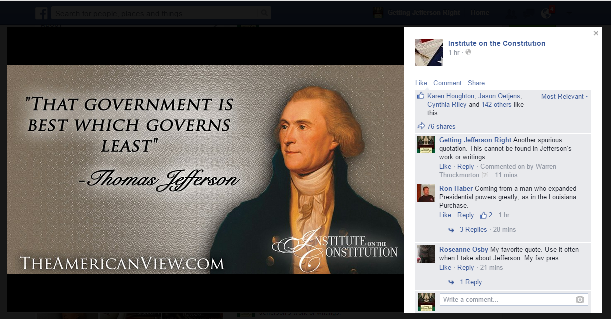In late June of 1826, Thomas Jefferson was in decline. He knew he was ill but continued to carry on correspondence until he died on July 4, 1826.
Jefferson had been invited to attend a 50 year celebration in Washington DC by Roger Weightman and, despite his ill health, declined the invitation with a remarkable letter about the rights of mankind.
Monticello June 24. 26
Respected Sir
The kind invitation I receive from you on the part of the citizens of the city of Washington, to be present with them at their celebration of the 50th. anniversary of American independance; as one of the surviving signers of an instrument pregnant with our own, and the fate of the world, is most flattering to myself, and heightened by the honorable accompaniment proposed for the comfort of such a journey. it adds sensibly to the sufferings of sickness, to be deprived by it of a personal participation in the rejoicings of that day. but acquiescence is a duty, under circumstances not placed among those we are permitted to controul. I should, indeed, with peculiar delight, have met and exchanged there congratulations personally with the small band, the remnant of that host of worthies, who joined with us on that day, in the bold and doubtful election we were to make for our country, between submission or the sword; and to have enjoyed with them the consolatory fact, that our fellow citizens, after half a century of experience and prosperity, continue to approve the choice we made. may it be to the world, what I believe it will be, (to some parts sooner, to others later, but finally to all,) the Signal of arousing men to burst the chains, under which monkish ignorance and superstition had persuaded them to bind themselves, and to assume the blessings & security of self-government. that form which we have substituted, restores the free right to the unbounded exercise of reason and freedom of opinion. all eyes are opened, or opening, to the rights of man. the general spread of the light of science has already laid open to every view. the palpable truth, that the mass of mankind has not been born with saddles on their backs, nor a favored few booted and spurred, ready to ride them legitimately, by the grace of god. these are grounds of hope for others. for ourselves, let the annual return of this day forever refresh our recollections of these rights, and an undiminished devotion to them.
I will ask permission here to express the pleasure with which I should have met my ancient neighbors of the City of Washington and of it’s vicinities, with whom I passed so many years of a pleasing social intercourse; an intercourse which so much relieved the anxieties of the public cares, and left impressions so deeply engraved in my affections, as never to be forgotten. with my regret that ill health forbids me the gratification of an acceptance, be pleased to receive for yourself, and those for whom you write, the assurance of my highest respect and friendly attachments.
Th. Jefferson
Jefferson hoped that the American action would stimulate enlightenment around the world. It is disturbing that his eloquence was not equaled by his action of removing saddles from the backs of his slaves. Even at his death, Jefferson did not free all of his slaves. Those saddles remained.
In the letter to Weightman, Jefferson did not locate the origin of his grand ideas. To Henry Lee, just over a year prior to his letter to Weightman (May 8, 1825), Jefferson provided similar thoughts about the Declaration of Independence and gave insight into the source of his beliefs as expressed in the Declaration of Independence:
[W]ith respect to our rights, and the acts of the British government contravening those rights, there was but one opinion on this side of the water. All American whigs thought alike on these subjects.
When forced, therefore, to resort to arms for redress, an appeal to the tribunal of the world was deemed proper for our justification. This was the object of the Declaration of Independence. Not to find out new principles, or new arguments, never before thought of, not merely to say things which had never been said before; but to place before mankind the common sense of the subject, in terms so plain and firm as to command their assent, and to justify ourselves in the independent stand we are compelled to take. Neither aiming at originality of principle or sentiment, nor yet copied from any particular and previous writing, it was intended to be an expression of the American mind, and to give to that expression the proper tone and spirit called for by the occasion.
All its authority rests then on the harmonizing sentiments of the day, whether expressed in conversation, in letters, printed essays, or in the elementary books of public right, as Aristotle, Cicero, Locke, Sidney, &c. …
David Barton preaches that the Declaration of Independence was “nothing more than” a collection of sermons preached before 1763. Watch:
[vimeo]https://vimeo.com/31136085[/vimeo]
The man who is most responsible for the Declaration of Independence referred to older authorities than American preachers. Inasmuch as the preachers expressed the same ideas as the conversations, essays, and correspondence among supporters of independence, they no doubt added to the “harmonizing sentiments of the day.” However, Barton’s claim about the Declaration of Independence is contradicted by the author.
